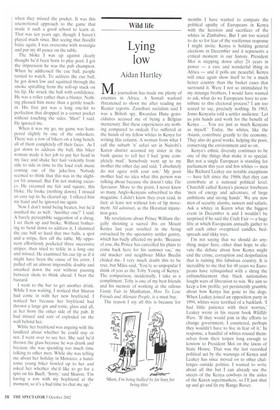Lying low
Aidan Hartley
M). journalism has made me plenty of enemies in Africa. A Somali warlord threatened to shoot me after reading my Reuter reports. Zanzibari socialists said I was a British spy. Rwandan Hutu genocidaires accused me of being a Belgian mercenary. But these experiences are nothing compared to ordeals I've suffered at the hands of my fellow whites in Kenya for writing this column. A woman from what I call the suburb 'n' safari set in Nairobi's Karen district accosted my sister in the bank queue to tell her I had 'gone completely mad'. Somebody went up to my mother the other day and said, 'I absolutely do not agree with your son.' My poor mother had no idea what this person was talking about because she doesn't take The Spectator. More to the point. I never knew so many Anglo-Kenyans subscribed to this magazine. I didn't know they even read, in fact; at least not without lots of lip movement. Nil admirari, as the Horatian injunction goes.
My revelations about Prince William illegally shooting a sacred ibis on Mount Kenya last year resulted in me being ostracised by the upcountry settler gentry, which has badly affected my polo. 'Because of you, the Prince has cancelled his plans to come back here for his summer vac,' my old mucker and neighbour Miles Bredin chided me. I very much doubt this to be true, but Miles said, 'You're so unpopular I think of you as the Toby Young of Kenya.' The comparison, incidentally, I take as a compliment. Toby is one of my best friends and his memoir of working at the odious Vanity Fair in Manhattan. How To Lose Friends and Alienate People, is a must buy.
The reason 1 say all this is because for
months I have wanted to compare the political apathy of Europeans in Kenya with the heroism and sacrifices of the whites in Zimbabwe. But I am too scared to do so for fear of the vociferous response I might invite. Kenya is holding general elections in December and it represents a critical moment in our history. President Moi is stepping down after 24 years in power — a rare and wonderful thing in Africa — and if polls are peaceful, Kenya will once again show itself to be a much better country than the basket cases that surround it. Were I not so intimidated by my mzungu brothers, I would have wanted to ask, what do we Europeans have to contribute to this electoral process? I am too scared to say, precisely nothing. In 1963, Jomo Kenyatta told a settler audience; 'Let us join hands and work for the benefit of Kenya .. . You are just as much Kenyans as myself.' Today, the whites, like the Asians, contribute greatly to the economy. They also do good works, helping the poor, conserving the environment and so on.
Kenya's ethnic diversity continues to be one of the things that make it so special. But not a single European is standing for parliament this year and few whites — men like Richard Leakey are notable exceptions — have felt since the 1960s that they can contribute at a national political level. Churchill called Kenya's pioneer forebears 'men of energy and adventure, of large ambitions and strong hands'. We are now men of security alarms, sunsets and safaris. Ask a whitey in Karen what the biggest event in December is and I wouldn't be surprised if he said the Craft Fair — a huge fete at which Europeans annually gather to sell each other overpriced candles, bedspreads and tikky toys.
I'm not saying that we should do anything major here, other than hope to elevate the debate about how Kenya might end the crime, corruption and despoliation that is ruining this fabulous country. It is incredible to me that for 40 years we Europeans have relinquished with a shrug the enfranchisement that black nationalists fought wars of liberation to win. We aim to keep a low profile, yet persistently grumble about how Kenya has gone to the dogs. When Leakey joined an opposition party in 1994, whites were terrified of a backlash. 'I had little patience with their worries,' Leakey wrote in his recent book Wildlife Wars. 'If they would join in the efforts to change government, I countered, perhaps they wouldn't have to live in fear of it.' In response, a handful of whites roused themselves from their torpor long enough to kowtow to President Moi on the lawns of State House. That was the last recorded political act by the wazungu of Kenya and Leakey has since moved on to other challenges outside politics. I wanted to write about all this but I can already see the sneers of the Kenya cowboys in the aisles of the Karen supermarkets. so I'll just shut up and go and fix my Range Rover.




































































 Previous page
Previous page